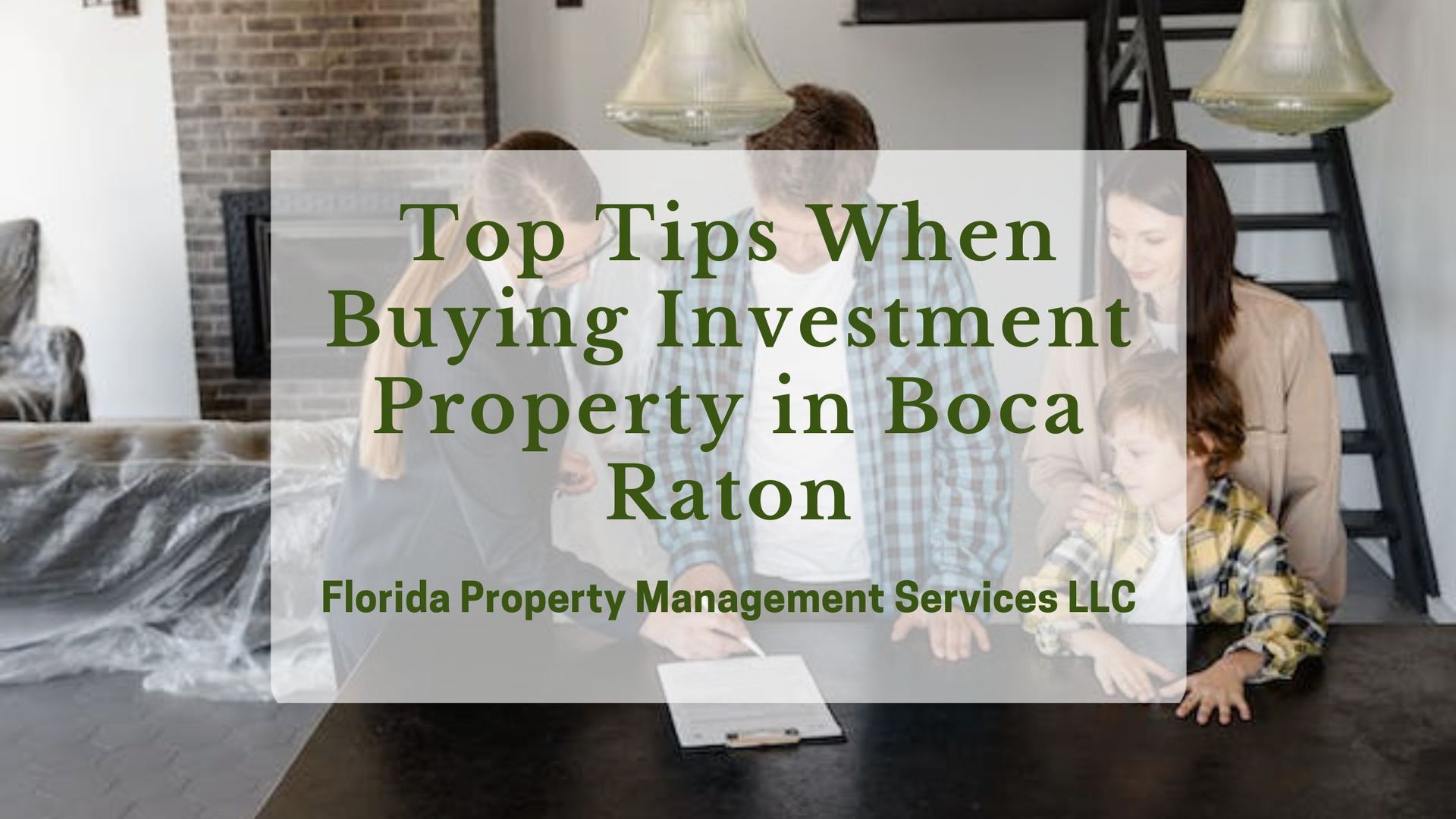Top Tips When Buying Investment Property in Boca Raton

Are you looking to purchase an investment property in Boca Raton?
Choosing to invest in real estate has been the go-to decision for most investors over the decades. The asset offers consistent rental income, an appreciation in property value, several tax advantages, and acts as an economic shock.
However, all these benefits are only accruable once you invest in the ideal property and location. In this article, the leading property company in the area analyzes the top investment tips when purchasing investment property in Boca Raton.
The Allure of Boca Raton
As a future rental property owner, one of your key investment points should be the performance of the local economy. The economy of Boca Raton and the larger Florida area has been growing steadily over the years. This diverse and strong economy translates to tenants having the capacity to pay their financial rental obligations.
The diverse and robust culture in the area is one of its most attractive features. As you walk through the streets, you will find almost every culture from the four corners of the world. To get a ‘taste’ of each culture, you must visit one of the many food establishments.
The area is renowned for its quality education at all levels. The public school system is highly rated. At an advanced level, some of the notable mentions include Lynn University, Florida Atlantic University, and Palm Beach State College.

Living in Boca Raton assures you of 300+ days of good weather in a calendar year. Even during the winter, the weather is mild and you can survive without breaking out the heavy jackets and coats. You are bound to see the snowbirds coming down from the north and east in their flocks.
Top Tips When Buying Investment Property in Boca Raton
#1: Know Your Obligations
Buying investment property means preparing yourself to be a landlord. As a rental property owner and lessor, you will be bound by the local ordinances, county, and state laws to meet certain expectations. And since they are provided for by law, failure to meet these expectations is considered an illegality.
We recommend that you keep yourself well-read when it comes to the laws applicable to rental property in Boca Raton. Being a landlord means that you have to put in the time, resources, and be ready to manage your tenants’ needs almost daily.
#2: Consider Location
As you research investment property, you must have heard about the mantra of ‘location, location, location’ reiterated. While it may start sounding like a broken record, the importance of it cannot be underestimated.
Property is an immovable asset and therefore, its value and rental demand are derived from the surrounding amenities and infrastructure. Put yourselves in your tenant’s shoes. Which amenities would they prioritize in their choice for a rental unit? Amenities such as transportation, proximity to shopping districts, and nearness to public spaces determine rental demand and appreciation in the long run.

#3: Understand Management Duties
Property management is one particular element that many rental property owners never give much thought. Management requires that you meet the needs of the property and also those of the tenants comprehensively. There is also compliance with State and federal laws, tenant screening, financial reporting, and property inspections.
Should you find yourself overwhelmed with the management of your Boca Raton, FL rental unit, consider contacting the #1 service provider in the region, Florida Property Management Services. We offer property management services to our clients located in Boca Raton, Miramar, Pembroke Pines, Coral Springs, Weston, and Fort Lauderdale among other locations.
#4: Prepare Your Finances
Few assets can compare to the price tag that is attached to property. Even the most affordable property will set you back a few hundred thousand dollars unless you are buying a foreclosed property.
Buying a property doesn’t mean that your other financial obligations are non-existent. Balancing all these financial needs (present and future) means that you will need to consider how you are going to finance the purchase. Most property owners use a mix of equity and debt (mortgage). Be sure to do your research extensively to identify the best mortgage terms for yourself.
#5: Research the Market
There is no substitute for
researching and analyzing the market. You need to read all the pertinent material with regard to your preferred location of interest. And since property is a function of economic performance, you need to be aware of what makes the local economy tick.

Furthermore, you should be aware that each investment market is unique; and heterogeneous. Just because you have invested in the neighboring State doesn’t mean you have a feel of the next. Assess the property from scratch to give yourself the best chances of success.
#6: Crunch the Numbers
Just like any other business, you will need to run the numbers to ascertain the viability of such an investment. Some of the property information you will need will include the rental rates, appreciation, tenant turnover, management costs, occupancy rates, yield, taxation, and percentage review.
While some of this information may be available in property journals and similar materials, some is not easily accessible. You may need to get in touch with a local professional who will source and avail this information for you.
Bottom Line
Investing in real estate is a bit different from your typical asset. As a result, you will need the help of a reputable and renowned expert in the local property market to assist you in navigating the muddy waters.
At Florida Property Management Services, you are guaranteed top-class professionalism, integrity, and honesty. Before you make the final decision, you will have received recent market information on the performance of your preferred local neighborhood.
In addition, we are a fully licensed real estate firm. Our property experts have the experience, expertise, and knowledge to ensure you make the best decisions possible. Get in touch with us today and receive a quote for our services.













